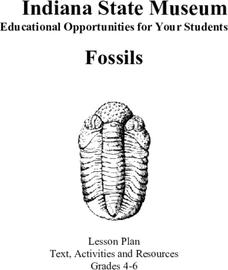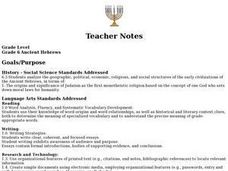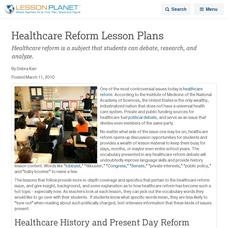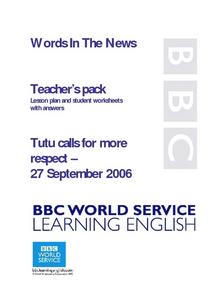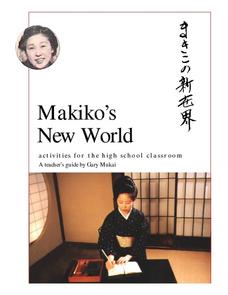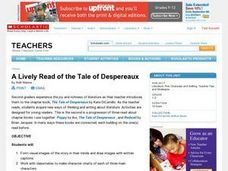Curated OER
Fossils
Students complete a unit on fossils. They read and discuss informational handouts, define key vocabulary terms, answer discussion questions, create a geologic timeline and a timeline of their own life, analyze bones, and create a fossil...
Curated OER
Hieroglyphs and Communication
Students compare modern day text messaging with the use of hieroglyphs as forms of communication. They translate hieroglyphic messages written by classmates and check for accuracy.
Curated OER
Reduce, Reuse, Recycle
Students brainstorm and share opinions about products that can be reused or recycled after reading the article, "Seattle's Recycling Success Is Being Measured in Scraps." They then investigate, analyze and evaluate articles on recycling...
Curated OER
The Weather
Students explore earth science by reading articles in class. In this weather identification lesson, students analyze weather science articles on the Internet and view their own local weather patterns as well. Students define a list of...
Curated OER
Pigs, Pigs, Pigs!
Third graders find information about different breeds of pigs using the Internet, books, and encyclopedias. Groups select one breed of pig that interests them. They construct a stuffed likeness of the pig.
Curated OER
Improving Elementary Reading Literacy
Students enhance their literary skills through phonemic awareness. In this reading development lesson plan, students read several storybooks and analyze the phonetics, vocabulary, and overall story. The students then rewrite what they...
Curated OER
Ancient Hebrews
Sixth graders analyze the geographic, political, economic, religious, and social structures of the early civilizations of the Ancient Hebrews, and write an essay.
Curated OER
Product Persuasion
Learners examine various products and analyze the marketing strategies used to entice consumers. They bring in a product they like to use, and using persuasive writing, they write their own advertisements for their products.
Curated OER
Martin Luther King Jr.: From Civil Rights to Human Rights
Learners read essays and participate in a discussion that examines Dr. Martin Luther King, Jr.'s stance on both civil rights and the broader issue of human rights. They conduct research about King's life and work, analyze quotes from his...
Curated OER
The Tides-Ups and Downs
Students investigate tidal patters and the forces that cause the tides. In this tidal lesson plan, students explore and research the tides and complete 43 questions about the causes of the tides, how they are monitored and measured and...
Curated OER
Development of Labor Unions
Learners examine the conditions that led to organized labor unions. In this 20th century America lesson, students compare and contrast the Knights of Labor Constitution, the American Federation of Labor Constitution, and the Industrial...
Curated OER
A Plop and Fizz
Seventh graders perform an experiment to determine the effect of temperature on reaction rates. In this chemistry lesson, 7th graders take measurements and record data. They create a graph and analyze results.
Curated OER
Alexis de Tocqueville’s America
Students analyze de Tocqueville's America. In this democratic history lesson, students use primary sources to determine what de Tocqueville found to be so unique in the America. Students analyze artifacts, maps and documents through...
Curated OER
Healthcare Reform Lesson Plans
Healthcare reform is a subject that students can debate, research, and analyze.
Curated OER
Illuminating Our Human Experiences: Soliloquy from Hamlet
Students determine the meaning of a soliloquy and examine the themes in Shakespeare's, Hamlet. In this literature lesson, students read Hamlet's soliloquy and watch a Photo Story 3 text model of such. They write a personal soliloquy...
Curated OER
In the Middle - Middle School Poetry
Students analyze and interpret poems. In this poetry lesson plan, students are read poems aloud, discuss the meanings in groups, and complete two worksheets after listening to the poems. Links to the worksheets and discussion...
Curated OER
Teaching the Novel in Context
Students write a context paper. In this teaching the novel in context lesson, students view a primary sources to recreate the cultural and historical context of the novel. Students make the connection between the literary...
Curated OER
Tutu Calls For More Respect
Students read a newspaper article about a lecture given by Desmond Tutu on the topic of respect. They define vocabulary, complete comprehension worksheets, analyze the use of reflexive pronouns and prepare a short oral presentation on a...
Curated OER
All Talk, No Action
Students act as senators to negotiate a compromise on judicial filibusters. For homework, they write letters to their senators analyzing the filibuster debate and making recommendations for the future.
Curated OER
Contacting Outer Space
Students read a newspaper article about a compilation of information on human life that is to be projected into outer space from a pyramid in Mexico. They define vocabulary, complete comprehension worksheets, analyze the use of 'to' plus...
Curated OER
Makiko's New World
Students analyze the internal and external causes of the Meiji Restoration. They look at the goals and policies of the state and their impact on Japan's modernization. Students also assess the impact of Western ideas on Japan and realize...
Curated OER
Making Friends
First graders examine the significance of the Louisiana Purchase and the journey of Lewis and Clark. They listen to a story, analyze a map, compare/contrast the Jefferson Peace Medal and the Peace Medal nickel, and design a peace and...
Curated OER
Lively Read of the Tale of Despereaux
Students create a character map of the main characters in The Tale of Despereaux. After reading the text, students create a character chart based on information they gleaned from the story. They use this information to write a letter...
Curated OER
Novel Creation
Students create an alternate ending with digital animations to illustrate their text. In this novel creation lesson, students read a novel and analyze the plot in small groups. Students collaborate on an alternate ending...
